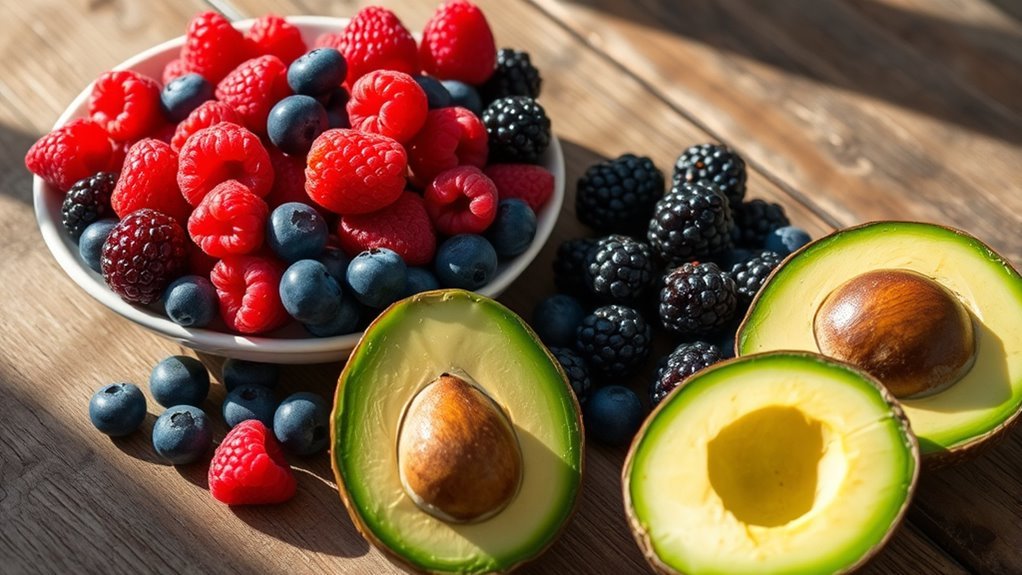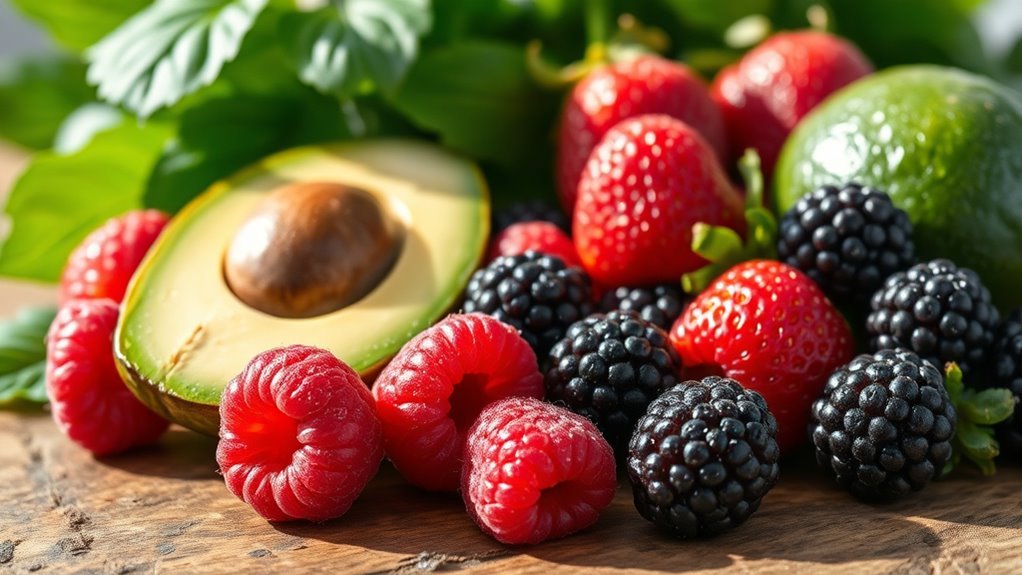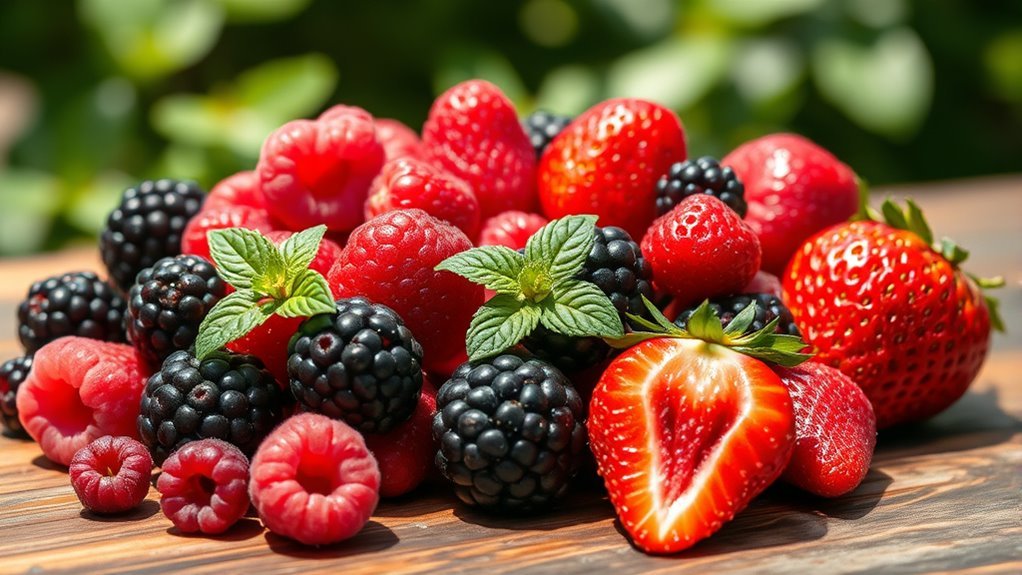Yes, you can have fruit on the keto diet, but you need to choose wisely. Focus on low-carb options like berries, avocados, and olives, which provide nutrients without exceeding your carb limits. Portion sizes are essential, as even healthy fruits can contribute to your daily intake. Balancing fruit within your overall macros allows you to enjoy the benefits without disrupting ketosis. Discovering more about which fruits fit best can enhance your keto journey.
Understanding the Keto Diet and Its Carb Limitations

While many people are drawn to the keto diet for its potential weight loss benefits, understanding its core principles—particularly the strict limitations on carbohydrate intake—is essential for success. The keto principles revolve around drastically reducing carbs to shift your body into ketosis, where it burns fat for fuel instead of glucose. Typically, this means limiting your daily carb intake to around 20-50 grams. Carb counting becomes vital here; it helps you track your intake to maintain ketosis. By focusing on high-fat, moderate-protein foods, you can enjoy a sense of freedom in meal choices, but you need to be mindful of hidden carbs in various foods. Balancing your diet with the right macronutrients is key to achieving your keto goals.
The Impact of Sugar and Carbs in Fruits

When it comes to the keto diet, understanding the sugar and carbohydrate content of fruits is essential. Fruits contain natural sugars, known as fruit sugar, which can greatly impact your daily carb intake. While some fruits are packed with vitamins and fiber, they often come with high carb content that can throw you out of ketosis. For instance, bananas and grapes have higher sugar levels compared to berries. It’s vital to be mindful of portion sizes and choose fruits that align with your keto goals. By doing so, you can enjoy the benefits of fruit while still adhering to the low-carb principles of the keto diet. Knowledge about fruit sugar and carb content empowers you to make informed choices.
Low-Carb Fruits That Fit the Keto Lifestyle

If you’re following a keto diet, knowing which fruits are low in carbs can help you enjoy the sweetness of nature without compromising your goals. When selecting fruits, focus on options like avocados, olives, and coconut, which are not only low in carbs but also packed with healthy fats. You can also consider rhubarb and tomatoes, which are surprisingly versatile in savory dishes. For fruit selection tips, always check the serving size to keep your carb count in check. Incorporating these fruits into your meals can create delicious keto-friendly snacks without jeopardizing your diet. Remember, moderation is key, and enjoying these low-carb fruits can provide variety while still adhering to your keto lifestyle.
Berries: A Keto-Friendly Fruit Option
When following a keto diet, berries can be an excellent choice due to their low-carb content. Options like raspberries, strawberries, and blackberries not only fit your carb limits but also offer a wealth of nutritional benefits, including antioxidants and vitamins. Incorporating these fruits into your meals can enhance flavor while keeping you aligned with your dietary goals.
Low-Carb Berry Choices
Although many fruits are high in carbohydrates, certain berries stand out as excellent choices for those following a keto diet. Blackberries, raspberries, and strawberries are among the lowest in carbs, making them perfect for your keto-friendly meals. You can enjoy a revitalizing berry smoothie without worrying about exceeding your carb limit. These berries not only satisfy your sweet tooth but also add vibrant flavor to keto desserts, such as cheesecake or chocolate mousse. Remember to keep portion sizes in mind to stay within your daily carb goals. With these low-carb berry options, you can indulge in delicious treats while maintaining the freedom and flexibility of your keto lifestyle. Enjoy the taste of summer without the guilt!
Nutritional Benefits of Berries
Berries are not just delicious; they also pack a nutritional punch that makes them a smart addition to a keto-friendly diet. Their high nutrient density and impressive antioxidant properties contribute to overall health, helping to combat inflammation and oxidative stress.
Here’s a quick look at some popular berries:
| Berry | Net Carbs (per 100g) | Key Nutrients |
|---|---|---|
| Raspberries | 5.4g | Vitamin C, Fiber |
| Strawberries | 7.7g | Folate, Manganese |
| Blackberries | 4.3g | Vitamin K, C, Fiber |
| Blueberries | 12.1g | Vitamin C, Antioxidants |
Avocado: The Ultimate Keto Superfruit
If you’re following a keto diet, incorporating avocados into your meals can be a game changer. These creamy fruits are packed with healthy fats, making them perfect for maintaining ketosis. One of the standout avocado benefits is their high fiber content, which aids digestion and keeps you feeling full longer. Plus, avocados are low in carbs, allowing you to enjoy their rich flavor without derailing your diet. You can whip up various avocado recipes, from guacamole to avocado salads, adding versatility to your meals. Rich in vitamins and minerals, avocados support overall health while keeping your carb intake in check. So, whether you slice them on your salad or blend them into smoothies, avocados are a fantastic choice for your keto lifestyle.
How to Incorporate Fruit Into Your Keto Meals
While it might seem challenging to include fruit in your keto meals, there are plenty of ways to do so without compromising your low-carb goals. You can whip up delicious fruit smoothies using low-carb options like berries or avocado. For a rejuvenating side, consider making fruit salads with a mix of keto-friendly fruits, topped with nuts or seeds for added crunch. When meal prepping, use fruits sparingly in keto desserts, like coconut flour brownies, to keep your carb count down. Don’t forget about creative snack ideas—opt for low-carb fruit toppings on Greek yogurt or chia pudding. With a bit of experimentation, you can enjoy recipe variations that incorporate fruit while staying true to your keto lifestyle.
Serving Sizes and Portion Control for Fruits
When incorporating fruit into your keto diet, it’s essential to be mindful of serving sizes to stay within your carb limits. Generally, a serving of low-carb fruits, like berries, should be around half a cup to help manage your overall intake. Understanding recommended servings can help you enjoy fruit while maintaining your dietary goals.
Recommended Fruit Servings
Understanding recommended fruit servings is essential for anyone following a keto diet, as it helps maintain the delicate balance of macronutrients. Keto fruit guidelines suggest that you should focus on low-carb options and limit your intake to about ½ cup of berries or a small piece of fruit daily. This approach allows you to enjoy the nutrients and flavors fruit offers without exceeding your carbohydrate limits. Keep in mind that portion control is vital; even healthy fruits can add up in carbs. By being mindful of your servings, you can enjoy the benefits of fruit while staying committed to your keto lifestyle, ensuring you have the freedom to savor flavors without compromising your goals.
Low-Carb Fruit Options
Selecting low-carb fruit options is essential for maintaining your keto diet without sacrificing flavor or nutrition. Berries like strawberries, raspberries, and blackberries are great low-carb alternatives, offering antioxidants and fiber while keeping your carb count down. When considering portion control, stick to small servings—about half a cup— to enjoy these fruits without overindulging. Avocados and olives are also excellent fruit substitutions that provide healthy fats and minimal carbs. Remember, moderation is key; incorporating these low-carb choices into your meals can satisfy your sweet cravings without derailing your progress. By understanding serving sizes and opting for low-carb fruits, you can enjoy variety in your diet while staying true to your keto goals.
The Importance of Nutrients in Fruit
Although the keto diet typically emphasizes low carbohydrate intake, the nutrients found in fruit can play a vital role in overall health. It’s important to reflect on nutrient density when choosing your foods. While you might lean towards fruit alternatives, don’t overlook the benefits of incorporating some low-carb fruits into your diet. Here are three key nutrients found in fruits that support your health:
Incorporating low-carb fruits into your keto diet can enhance nutrient density and support overall health.
- Vitamins: Fruits are rich in essential vitamins like C and A, which boost immunity and skin health.
- Minerals: They provide important minerals such as potassium and magnesium, vital for muscle function and heart health.
- Antioxidants: Many fruits are packed with antioxidants that help combat oxidative stress and inflammation.
Balancing these nutrients can enhance your well-being while staying within your keto lifestyle.
Balancing Fruit Intake With Your Macros
When following a keto diet, it’s essential to balance your fruit intake with your macros to stay within your carbohydrate limits. Opting for low-carb fruit options, paying attention to serving sizes, and timing your consumption can help you enjoy fruit while maintaining ketosis. By making informed choices, you can incorporate fruit in a way that aligns with your dietary goals.
Low-Carb Fruit Options
Finding the right balance between enjoying fruit and staying within your macro limits can be a challenge on the keto diet, but there are several low-carb options that can fit seamlessly into your meal plan. These fruits offer nutrient density while maintaining a low glycemic index, helping you satisfy your cravings without derailing your goals. Here are three great choices:
- Berries (like raspberries, strawberries, and blackberries) – Low in carbs and high in antioxidants.
- Avocado – Technically a fruit, it’s rich in healthy fats and fiber, keeping you full.
- Coconut – Its meat and unsweetened flakes are low in carbs and provide healthy fats.
Incorporating these options allows you to enjoy fruit while adhering to your keto lifestyle.
Serving Sizes Matter
Serving sizes play a crucial role in successfully incorporating fruit into your keto diet. While you can enjoy some low-carb fruits, portion control is essential to keep your carb intake in check. Following serving guidelines can help you balance your macros without feeling deprived. For instance, a small handful of berries or a few slices of avocado can provide nutrients without pushing you over your daily carb limit. Remember, the key is moderation; a little fruit can add flavor and variety to your meals. By being mindful of how much you consume, you’ll maintain the flexibility of your diet while still adhering to keto principles. Freedom in your food choices doesn’t mean sacrificing your goals—just be mindful of serving sizes!
Timing Your Consumption
Balancing your fruit intake with your macros requires attention not only to serving sizes but also to timing. Proper fruit timing can enhance your energy levels and support your keto goals. Here are some effective consumption strategies:
- Pre-Workout: Eating a small portion of low-carb fruit, like berries, before exercise can provide a quick energy boost without derailing your ketosis.
- Post-Meal: Enjoying fruit after a meal may help manage blood sugar levels and reduce cravings, creating a more balanced eating experience.
- Midday Snack: Incorporate fruit during your lunch break to satisfy your sweet tooth while keeping your overall carb intake in check.
Tips for Choosing the Right Fruits on Keto
How can you enjoy fruit while sticking to a keto diet? First, focus on low-carb fruits to keep your net carbs in check. Berries are great options, and you can create delicious fruit combinations to satisfy your cravings. Don’t forget to reflect on seasonal fruits, as they can offer variety and freshness to your meals.
Here’s a handy guide:
| Low-Carb Fruits | Serving Size | Net Carbs |
|---|---|---|
| Raspberries | 100g | 5g |
| Blackberries | 100g | 5g |
| Strawberries | 100g | 7g |
| Avocado | 100g | 2g |
Incorporating these options will help you maintain balance while enjoying freedom in your diet.
Frequently Asked Questions about Fruit on the Keto Diet
1. Can I eat any fruit on the keto diet?
While the keto diet is low in carbohydrates, you can still enjoy certain fruits in moderation. Fruits that are lower in sugar and higher in fiber, such as berries (strawberries, raspberries, and blackberries), avocados, and olives, are typically more keto-friendly. It’s important to monitor your portion sizes to stay within your daily carb limit.
2. What are the best keto-friendly fruits?
Some of the best keto-friendly fruits include:
- Berries: Strawberries, blueberries, raspberries, and blackberries are lower in carbs and high in antioxidants.
- Avocado: High in healthy fats and very low in carbs, making it an excellent choice.
- Olives: Rich in healthy fats and low in carbs, perfect for snacking.
- Coconut: Both fresh coconut and unsweetened coconut products can be enjoyed in moderation.
Always keep track of your overall carb intake to maintain ketosis.
3. How many carbs are in keto-friendly fruits?
The carb content varies among fruits. Here are approximate net carbs per 100 grams:
- Strawberries: 7.7g
- Raspberries: 5.4g
- Blackberries: 4.9g
- Avocado: 1.8g
- Olives: 3.1g
Always check nutritional information as it can vary based on ripeness and variety.
4. Can eating fruit kick me out of ketosis?
Eating high-carb fruits in large quantities can indeed kick you out of ketosis, as it may exceed your daily carb limit. However, if you choose low-carb fruits and consume them in moderation, they can fit into your keto diet without disrupting ketosis. It’s essential to monitor how your body reacts and adjust portions accordingly.
5. What should I avoid when it comes to fruit on keto?
When following a keto diet, it’s best to avoid high-sugar fruits such as:
- Bananas: High in carbs and sugar.
- Grapes: Contains a lot of natural sugars.
- Mangoes: Very high in sugar content.
- Pineapples: Also quite sugary.
These fruits can quickly add up in carbs and may hinder your ability to maintain ketosis.
References
- https://www.healthline.com/nutrition/fruit-on-keto-diet
- https://www.ncbi.nlm.nih.gov/pmc/articles/PMC6520957/
- https://www.webmd.com/diet/what-is-the-keto-diet
- https://www.dietdoctor.com/low-carb/keto/foods
- https://www.nhs.uk/live-well/eat-well/what-is-the-keto-diet/
- https://www.mayoclinic.org/healthy-lifestyle/nutrition-and-healthy-eating/in-depth/keto-diet/art-20484823
- https://www.medicalnewstoday.com/articles/what-to-know-about-the-keto-diet
- https://www.journalofnutrition.org/content/149/12/2121S.full
- https://www.cdc.gov/healthyweight/healthy_eating/index.html


